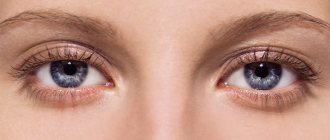Darkening in the eyes is an extremely uncomfortable and unpleasant phenomenon. It can take a person by surprise at any moment. Unfortunately, everyone has encountered this phenomenon at least once in their life. But in some cases, darkening can occur with enviable regularity. What to do and how to behave if your vision often gets dark? What are the reasons for such an unpleasant phenomenon? How to deal with this?
It often becomes dark in the eyes
Main causes not related to disease
- 7.1 Video: Headaches, blackouts, fainting
The patient may not have any problems with the vascular system, regular frequent dizziness and any problems with the condition of the body and health, but he may still encounter such a phenomenon as a sharp darkening before the eyes, a feeling of weakness will appear, it may feel short-term but severe impairment of visual function. And sometimes this phenomenon is very frightening - most people immediately plan a visit to the doctor to understand what caused the sudden appearance of “darkness” and unpleasant “floaters” before their eyes.
Black spots before eyes
And sometimes people run to an ophthalmologist, although they have never had problems with their eyes before. But an ophthalmologist may not provide the necessary help, since for the most part such unpleasant phenomena do not appear due to reasons directly related to the eyes. Let's look at some of them.
The eyes may become dark for various reasons.
On a note! Doctors scientifically call this condition orthostatic hypotension. It is due to the fact that for some reason the blood did not reach the brain in sufficient quantities - it begins to experience a nutritional deficiency.
Hypotension
So, the reasons that are not related to health, but can cause darkening in the eyes, are the following.
- Severe lack of fluid in the body . A person should drink at least 2 liters of water every day. If this rule is not followed, the body begins to experience a lack of fluid.
- Nutritional features - these include mono-diets, fasting, a low-carbohydrate diet, etc. In this case, the body reacts to a lack of some nutrients.
- Changes that occur in the body due to age. Darkening can be experienced by teenagers, older people, and women in menopause.
Age-related changes are one of the possible reasons - Nervous shock or any effect on the body.
- Bad habits also provoke darkening . Both smoking and excessive alcohol consumption do not maintain the body in proper condition, but only kill it. They negatively affect the condition of the body.
- Use of a number of medications , such as sedatives, diuretics, as well as drugs that act on blood vessels, dilating them.
- Sometimes pregnant women can also get dark before their eyes. This usually happens in the first months of pregnancy.
Pregnancy is one of the possible reasons - Overwork - both physical and psychological or emotional . Typically, darkening occurs as a result of lack of rest for a long time. In this case, the person complains of poor sleep or other similar problems.
- Serious and unusual physical activity , unusual for the body, sudden lifting of the body, prolonged standing in one place in a room with a lack of oxygen, etc.
- Taking a flight - the pressure changes that the body experiences inside the plane can also provoke the appearance of darkness in the eyes.
Pregnancy and air travel
On a note! Darkening of the eyes can also be accompanied by such phenomena as headaches and dizziness.
Headache
How to improve your well-being?
If you feel dizzy and weak after playing sports, you should first lie down on the bed, with your head slightly higher than body level. In order for fresh air to start flowing into the room, you should open the window, but only slightly, since after physical exertion you can quickly catch a cold. After this, it is recommended to massage the head and neck.
When you feel nauseous, dizzy and have a headache after exercise, a bath with lavender and mint tea will help. If such symptoms are caused by dehydration, then you need to replenish the fluid lost during exercise.
In most cases, the methods listed above help get rid of unpleasant sensations. However, if there are signs of a stroke, you should urgently call an ambulance:
- incessant vomiting;
- fainting;
- dizziness;
- loss of sensation in the limbs or face;
- ataxia (lack of coordination of movements);
- loss of ability to speak clearly;
- clouding of mind;
- visual impairment.
Causes associated with pathologies
Darkness in the eyes can occur not only as a result of the above. In some cases, certain diseases can provoke this phenomenon. If darkening is observed regularly, then it makes sense to visit a doctor and undergo an examination. Most likely, this symptom was provoked by the development of some pathology, which is not always conditionally safe.
If you experience regular darkening in your eyes, you should consult a doctor.
It is especially important to consult a doctor as quickly as possible if the patient has other serious symptoms, including seizures and regular migraines.
Table. Some causes of darkening.
| Cause | brief information |
| Pressure change | If the pressure decreases, then the person complains of dizziness, if it increases, then of headaches and problems with coordination. All this is in addition accompanied by the appearance of darkness in the eyes. |
| Atherosclerosis of blood vessels in the neck area | If the vessels supplying the brain are clogged with lipid deposits, then the brain will in any case begin to experience a shortage of the substances it needs, delivered through the blood. In this case, problems may also arise in terms of psycho-emotional state, as well as a number of other problems. |
| Anemia associated with iron deficiency | In this case, the human body does not receive the required amount of an element such as iron, and its deficiency appears. Anemia is usually accompanied by deterioration of the condition of nails and hair, dry skin, etc. Fainting may occur. |
| Bradycardia | This is a pathology associated with the heart and is characterized by a decrease in heart rate (up to 40 beats per minute). In this case, fainting, darkening of the eyes and a number of other symptoms become frequent companions of a person. Sometimes the condition may be such that in the absence of timely help a person may die. |
| VSD | The abbreviation stands for vegetative-vascular dystonia. This is a whole set of body disorders that are associated with a number of organ dysfunctions. In this case, the person sleeps poorly, often feels dizzy, and experiences general weakness. The disease can be inherited or develop over time. |
| Diabetes | Diabetes mellitus is a terrible disease, unfortunately, incurable. A person constantly needs maintenance injections. The pathology is accompanied by vision problems, headaches, swelling of the limbs, etc. |
Bradycardia - abnormal heart contractions
Attention! Dysfunction of the vitreous body of the eye can also provoke frequent darkening. In this case, the person also complains of dizziness and generally worsening vision.
At the doctor
Dizzy and dark vision: causes of illness and its treatment
Darkening of the eyes is a common accompanying symptom of dizziness.
These two signs can appear simultaneously, for example, after physical or emotional stress. At the same time, they may indicate diseases and disorders affecting body systems. Feelings of dizziness and darkness in your eyes should not be ignored, especially if they occur regularly.
In such cases, consulting a doctor and undergoing diagnostics is a mandatory measure.
Dizzy and dark vision: causes of the disease
With the regular occurrence of dizziness, accompanied by darkening of the eyes, it is important to determine which factor, physiological or pathological, causes these unpleasant sensations. To do this, it is necessary to identify in which cases such symptoms appear.
“Safe” reasons
There are many factors that can cause a person to feel dizzy and have dark vision. Some of them are not associated with pathologies, so to normalize well-being, it is enough to eliminate their effects. Reasons that cause short-term dizziness and darkening of the eyes include:
- dehydration – not enough water in the daily diet can lead to the symptoms described;
- emotional overstrain, past stress - strong excitement, fright and a feeling of fear contribute to the release of adrenaline, due to which the blood vessels narrow and the brain does not receive enough oxygen;
- advanced age - after 60 years, the functionality of the hematopoietic system and vestibular apparatus decreases, which leads to dizziness with darkening of the eyes at the slightest physical exertion;
- taking medications – unpleasant symptoms occur as a side effect or individual intolerance;
- weak vestibular apparatus - the effect of “motion sickness” occurs when traveling on any type of transport, riding on a swing, climbing to a height, looking at objects in the form of a swinging pendulum;
- intense physical activity - hard physical labor, preparation for sports competitions;
- pregnancy, menopause or menstrual cycle - symptoms arise at the time of hormonal changes in the body;
- strict diets - in particular, restriction in the diet of foods rich in carbohydrates;
- Alcohol abuse – darkening of the eyes with severe dizziness is a constant symptom of alcohol intoxication.
The impact of the described factors does not lead to the development of pathologies, but creates significant discomfort and the risk that a person may be injured at the moment of dizziness and darkening of the eyes.
If the cause is a disease
Structure of the inner ear
If your vision gets dark and you feel dizzy, then this can be caused not only by the “harmless” reasons described above, but also by serious diseases affecting the main vital systems. These include:
- orthostatic hypotension - a sudden decrease in blood pressure, as a result of which the brain tissue experiences oxygen deficiency;
- vegetative-vascular dystonia is a complex of disorders of the autonomic and nervous system, due to which there is a malfunction in the functioning of all vital systems;
- anemia – lack of iron (red cells in the blood structure);
- hypoglycemia – a deficiency of glucose in the blood, which causes the brain to lack nutrition;
- endocrine disorders, in particular hypothyroidism;
- migraine;
- atherosclerosis – unpleasant symptoms arise due to poor blood circulation in areas of narrowing of blood vessels;
- otitis media, occurring in acute and chronic forms;
- Meniere's disease, which develops in the structures of the inner ear;
- intracranial tumors and hematomas resulting from trauma;
- cervical osteochondrosis and other diseases affecting the cervical vertebrae;
- vision disorders - glaucoma, retinal damage;
- temporal arteritis;
- stroke.
Each disease described is characterized by additional symptoms, the presence of which the doctor takes into account when making a diagnosis.
What to do if you experience symptoms of dizziness and darkening of the eyes
If you often experience symptoms such as: “dizzy”, “darkening in the eyes”, then consultation with a doctor is mandatory, because these unpleasant sensations can signal hidden pathologies that need to be treated urgently. To determine the reason why your head is spinning and your vision is getting dark, you may need a comprehensive examination, which includes the following diagnostic techniques:
- blood pressure measurement;
- assessment of the condition of blood vessels using encephalography;
- ultrasound examination of the blood vessels of the brain and cervical spine;
- examination of brain structures using MRI to detect tissue damage and the development of acute inflammatory processes;
- conducting a CT scan to detect degenerative changes in the cervical vertebrae and the presence of tumor-like processes occurring in the brain tissue;
- examination of the condition of the fundus and oculomotor nerves;
- eye pressure measurement;
- optical coherence tomography – to assess the condition of the retina and optic nerves;
- blood tests (biochemical, clinical) - to determine the level of glucose, cholesterol, hemoglobin, thyroid and sex hormones;
- bacteriological culture and blood sampling to identify infections and viruses that provoke severe inflammation of the brain;
- neurological tests - if vegetative-vascular dystonia and other neurological disorders are suspected.
People who regularly experience dizziness with blackouts should be able to help themselves to avoid injury and loss of consciousness. To do this, depending on the reason that caused the discomfort, at the time of the attack you should perform the following actions:
- stop if you feel dizzy while moving and concentrate your gaze on a single point;
- carefully walk to a bench, wall or other object that you can lean on;
- unbutton the collar of your clothing to ensure free breathing;
- wipe your face (frontal area, temples) and neck with a damp cloth;
- eat candy or drink sweet water if the attack occurs due to a lack of glucose;
- measure your blood pressure to understand what may be causing the attack.
If unpleasant symptoms not only do not go away, but are also supplemented by a number of signs indicating pathology, you need to consult a doctor at a clinic or call an ambulance.
How to treat
Dizziness and darkening of the eyes are symptoms, so to eliminate them, you need to treat the disease whose development they signal.
In most cases, it is enough to adjust the diet, daily routine and limit exposure to factors that provoke this condition for the symptoms to disappear.
However, in the presence of serious disorders and inflammatory processes, accompanied by darkening of the eyes and dizziness, drug therapy cannot be avoided. In such cases, the patient is prescribed medications from the following groups:
- Anti-inflammatory drugs and antibiotics - for acute otitis media, labyrinthitis, and infectious diseases of the brain.
- Nootropic and sedatives, drugs that normalize blood flow, antidepressants - for vegetative-vascular dystonia, changes in blood pressure, stress and depression.
- Muscle relaxants, chondroprotectors, physiotherapy, massage sessions - for osteochondrosis and other pathologies of the cervical spine.
- B vitamins, calcium channel blockers, as well as drugs that provide brain nutrition - for brain hypoxia, mental fatigue.
- Iron-containing medications – for diagnosed anemia.
- Hormonal drugs - prescribed in cases of hormonal imbalance in the reproductive or endocrine system.
The duration, regimen and dosage of medications should be determined by the doctor, based on the results of the diagnostic study and the patient’s condition.
Ivan Drozdov, neurologist
The information on the site is created for those who need a qualified specialist, without disturbing the usual rhythm of their own lives.
Source: https://progolovy.ru/zabolevaniya/temneet-v-glazax-i-kruzhitsya-golova
Hypotension
Let's take a closer look at some diseases that cause darkening of the eyes. So, hypotension is one of them, which occurs quite often and is associated with a decrease in blood pressure. There are several types of this disease, depending on the cause of low blood pressure:
- congenital hypotension;
- medicinal;
- orthostatic;
- physiological.
Hypotension
Thus, low blood pressure can be caused by hereditary factors, stress, medications, and also occurs as a result of a number of factors affecting the body (physical activity, pregnancy, etc.). In some cases, hypotension accompanies a person throughout his life, and may occur against the background of other pathologies.
With hypotension, a person experiences fatigue and drowsiness, complains of migraines, etc. Darkening is also a fairly common result of decreased blood pressure.
Symptoms of hypotension
Orthostatic hypotension is the same type of pathology when a person’s vision becomes dark. Typically, the phenomenon occurs if the patient suddenly moves to a vertical position from a horizontal position or suddenly rises from a squatting position. In this case, darkening and faintness occur very suddenly. If a person does not find support for himself, he may fall. The condition is short-term and lasts only 3-5 minutes, but the pressure during this period decreases extremely significantly.
Darkening when changing body position
It gets dark in my eyes and I feel dizzy when I get up, what to do: causes and treatment methods
A sudden change in body position can lead to unpleasant sensations, manifested by darkening of the eyes and dizziness.
These symptoms indicate possible somatic and neurological diseases. To establish the cause of the pathology, it is necessary to conduct a thorough examination of the patient.
This will allow you to prescribe the most effective treatment tactics and prevent the progression of the underlying disease.
What is pathological orthostatic hypotension?
Orthostatic hypotension is an important clinical syndrome that occurs in many neurological and somatic pathologies.
It is characterized by a drop in systolic pressure at the time of myocardial contraction by more than 20 mmHg. Art. and diastolic - at the moment of relaxation of the heart by more than 10 mm Hg. Art.
after changing body position for 3 minutes in an upright position.
The main symptom of this syndrome is a sharp decrease in blood pressure as a result of a change from horizontal to vertical position. In the early stages of its development, patients may experience signs of fainting.
In addition, patients may complain of general weakness, increased sweating, noise in the head and ears, and a feeling of discomfort in the epigastrium. There is also a pallor of the skin, in some cases with a waxy tint.
In more severe situations, the clinical picture becomes more pronounced. Mild orthostatic circulatory disorders are limited to symptoms of a lipothymic state.
With severe lesions, fainting develops after lipothymia. Its duration directly depends on the cause that caused this condition.
In the case of neurogenic and reflex factors, it is 10-12 s.
Quick help with tablets
If there is darkening in the eyes and dizziness after changing body position, medications can be used to stabilize the patient's condition. These include:
- Vaso collected. Take 1 tablet 2 times a day with meals with a small amount of water.
- Betaserk. The drug is taken with food. The daily dose of the drug is 25-50 mg.
- Tanakan. This is an oral medicine. The dose for adults is 80-120 mg.
Treatment
Before starting treatment, it is important to find out why your eyes get dark and you feel dizzy. Elimination of pathological orthostatic hypotension directly depends on the treatment of the underlying disease.
Useful information In some cases, to stabilize the patient’s condition, it is enough to adjust the diet, establish a daily routine, and also eliminate the influence of factors that negatively affect the nervous system.
If there is no effect from these measures, the patient is prescribed medication, the action of which is aimed at eliminating the cause of the pathology. Antibiotics Azithromycin, Tetracycline, Doxycycline, and Cefuroxime are used to treat bacterial infections.
In order to eliminate inflammatory processes, NSAIDs and corticosteroid drugs are prescribed. These include Nimesulide, Ibuprofen, Diclofenac, Prednisolone, Hydrocortisone.
To strengthen cartilage tissue in cervical osteochondrosis, chondroprotectors are used. Representatives of this group are Teraflex, Alflutop, Structum, Chondroitin. In the treatment of cardiovascular pathology, calcium antagonists and calcium channel blockers are prescribed. Among them, Diltiazem, Bepridil, Nifedipine, Verapamil are most often prescribed.
Cavinton is used to improve cerebral circulation. Among the agents that improve the conduction of nerve impulses in the spinal cord, Proserin, Milgamma and Neuromidin are used.
Folk remedies
The use of alternative medicine recipes is possible in combination with drug therapy. Among the most effective drugs for orthostatic hypotension are:
- Infusion of St. John's wort herb. One tablespoon of the plant should be poured with 200 ml of boiling water. The resulting solution needs to sit for at least 1 hour, after which the liquid should be filtered. Take the infusion 3 times a day before meals, 50 ml.
- Infusion of tansy flowers. Half a glass of dried inflorescences is poured with 500 ml of cold boiled water and allowed to brew for 4 hours in a closed container. After this, the solution must be filtered. You need to take the product 100 ml 2-3 times a day half an hour before meals.
Prevention and basic recommendations
To prevent the development of cases of orthostatic hypotension, as well as its relapses in the future, you need to adhere to a number of recommendations aimed at stabilizing the functioning of the nervous and cardiovascular systems. These include:
- maintaining an active lifestyle;
- balanced diet, high in vitamins;
- regular walks in the fresh air;
- taking a contrast shower;
- taking a massage course;
- compliance with the drinking regime;
- rejection of bad habits;
- good sleep;
- daily ventilation of the living space;
- avoiding emotional stress and stress.
If your vision often gets dark and you feel dizzy due to a change in body position from horizontal to vertical, you need to consult with specialized specialists. Timely detection of the cause of pathological orthostatic hypotension allows us to prescribe the most effective treatment tactics and preserve the patient’s health.
2897 ratings
Source: https://nervy-expert.ru/neurology/golovokruzhenie/temneet-v-glazax-i-kruzhitsya-golova-kogda-vstayu/
Osteochondrosis
Yes, diseases of the spine, in particular the cervical spine, can cause frequent darkening of the eyes. The fact is that inside the spinal column there is a special canal, inside which not only the spinal cord passes, but also important blood lines that feed the brain. If they are partially compressed, then blood in the required quantity will not be able to flow to the brain. Clamping can occur as a result of osteochondrosis. The result is impaired blood circulation in the brain.
Osteochondrosis of the cervical spine
On a note! The phenomenon of darkness before the eyes, resulting from osteochondrosis, is often observed in the morning or after sleeping on an uncomfortable pillow.
Cervical osteochondrosis
Other therapies
For dizziness and darkness before the eyes, you can take medicinal herbs or tinctures, for example, hawthorn, St. John's wort, valerian or peony. If such symptoms are caused by low blood pressure, then you should avoid alcoholic beverages and follow a low-carbohydrate diet.
Those who suffer from anemia while carrying a child should avoid taking medications; it is best to increase hemoglobin in the blood using folk remedies. For example, juices from carrots and beets will quickly raise your iron levels, and constant consumption of pomegranates and apples will help improve your well-being.
To increase the volume of circulating blood, you need to add foods containing sodium to your diet. If swelling is not a concern, then you should add more salt to your food.
When experiencing unpleasant symptoms of osteoporosis, it is recommended to quit bad habits, walk more, and stop drinking carbonated drinks and coffee. It is also important to eat foods rich in calcium: kefir, cheese, hazelnuts, spinach, walnuts and milk.
Arrhythmia
The pathology is often provoked by problems with water-salt metabolism or hormonal imbalance, but often also occurs as a result of heart failure and problems with the acid-base balance of the human body. Arrhythmia is divided into two types, one of which is shown in the table below:
- tachycardia;
- bradycardia.
There are two types of arrhythmia
In the first case, there is an increase in heart rate, in the second - a decrease. In both cases, a person may complain of darkening of the eyes, but this phenomenon is usually observed with bradycardia. With tachycardia, the patient experiences shortness of breath and a state of panic.
On a note! Darkening in the eyes is often noted by people who are dependent on weather conditions. When the weather changes, they may feel unwell.
Physiology of tachycardia
Video: 5 reasons why you feel dizzy and get dark when you stand up suddenly
Treatment of ailments
When a person complains that he is dizzy and there is darkness before his eyes, you need to lay the victim on his back and provide him with access to fresh air. In this case, your head should be turned to the side and your legs slightly raised. After these manipulations, you need to seek help from doctors.
For VSD, treatment is aimed at reducing the excitability of the nervous system and strengthening the vascular walls. Patients take medications prescribed by a doctor to eliminate vegetative-vascular dystonia:
- Prozac, Maprotiline or Paxil are psychotropic drugs.
- "Aminazine", "Leponex" and "Melleril" are neuroleptics.
- “Fitosed”, “Valocordin”, “Persen”, “Novo-Passit” are sedative sedatives.
- Glycine is a neurotransmitter.
- “Ginkgo Biloba”, “Dopamine”, “Acephen” are nootropic medications.
Diagnostics
Since there are a huge number of diseases that cause darkening of the eyes, it will not be possible to immediately understand which specialist you need to contact. Therefore, the best place to start is to go to a therapist . It is he who, after a general examination and collection of anamnesis, will refer the patient either to specialized specialists or to certain types of studies.
Among highly specialized specialists, it is recommended to visit an ophthalmologist, who will rule out or confirm the presence of eye problems. You should also sign up for an MRI of the brain, ultrasound and vascular angiography. In some cases, it will be necessary to take a cardiogram or perform an orthostatic test.
Diagnostic features
Attention! The greatest value for the doctor at the first stage of the examination will be the result of the orthostatic test. It will allow you to identify the frequency of contractions of the heart muscle at rest and during active movements. It will also demonstrate the level of blood pressure when changing body position from horizontal to vertical.
An orthostatic test is carried out like this: doctors count the pulse several times, and also measure pressure, if possible, in different positions of the person’s body (standing, lying down). Moreover, measurements are taken immediately after changing the position, as well as after 60 seconds, 3, 5 and 10 minutes. These indicators are necessary to assess the rate of restoration of normal rhythm at rest. If the pulse increases by 19 beats, then the test is considered unsatisfactory; if by only 11, then the person’s tolerance to such changes is good.
Orthostatic test
How to come to your senses?
A person, having felt darkening in the eyes, will try with all his might to return to a normal state as quickly as possible, since the feeling of darkness is a rather unpleasant and uncomfortable phenomenon.
Step 1. It is recommended that you first sit down or lie down and give yourself the opportunity to be calm for a while.
It is recommended to lie down first
Step 2. It is recommended to place your legs higher than your head to ensure blood flow to the brain.
Feet should be higher than head
Step 3. If it is impossible to lie down, you need to at least sit down, lower your head between your knees and sit for a while.
At the very least, sit for a while
Step 4. Next, it is recommended to drink water or tea.
Drink some water
Step 5. If you feel very bad and there is a feeling of imminent fainting, then you should ask for help from others.
Ask someone for help
Step 6. It is recommended to call an ambulance if the condition does not improve.
Call an ambulance
Step 7. You need to ask to go home from work and take a couple of days off to rest and rest.
Take a day off from work
Step 8. It is recommended to change your daily routine, provide yourself with adequate rest and establish proper nutrition, then the attacks may not recur.
Lead a healthy lifestyle











